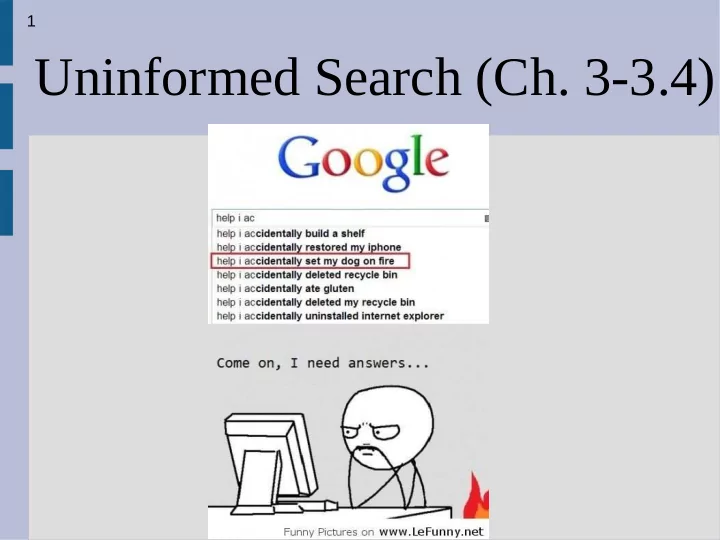

1 Uninformed Search (Ch. 3-3.4)
2 Announcements HW due tonight Writing 1 due next week
3 Search algorithm To search, we will build a tree with the root as the initial state Any problems with this?
6 Search algorithm We can remove visiting states multiple times by doing this: But this is still not necessarily all that great...
9 Search algorithm The search algorithms metrics/criteria: 1. Completeness (does it terminate with a valid solution) 2. Optimality (is the answer the best solution) 3. Time (in big-O notation) 4. Space (big-O) b = maximum branching factor d = minimum depth of a goal m =maximum length of any path(depth of tree)
11 Breadth first search Breadth first search checks all states which are reached with the fewest actions first (i.e. will check all states that can be reached by a single action from the start, next all states that can be reached by two actions, then three...)
12 Breadth first search (see: https://www.youtube.com/watch?v=5UfMU9TsoEM) (see: https://www.youtube.com/watch?v=nI0dT288VLs)
13 Breadth first search BFS can be implemented by using a simple FIFO (first in, first out) queue to track the fringe/frontier/unexplored nodes Metrics for BFS: Complete (i.e. guaranteed to find solution if exists) Non-optimal (unless uniform path cost) Time complexity = O(b d ) Space complexity = O(b d )
14 Breadth first search Exponential problems are not very fun, as seen in this picture:
15 Uniform-cost search Uniform-cost search also does a queue, but uses a priority queue based on the cost (the lowest cost node is chosen to be explored)
16 Uniform-cost search The only modification is when exploring a node we cannot disregard it if it has already been explored by another node We might have found a shorter path and thus need to update the cost on that node We also do not terminate when we find a goal, but instead when the goal has the lowest cost in the queue.
17 Uniform-cost search UCS is.. 1. Complete (if costs strictly greater than 0) 2. Optimal However.... 3&4. Time complexity = space complexity = O(b 1+C*/min(path cost) ), where C* cost of optimal solution (much worse than BFS)
18 Depth first search DFS is same as BFS except with a FILO (or LIFO) instead of a FIFO queue
19 Depth first search Metrics: 1. Might not terminate (not correct) (e.g. in vacuum world, if first expand is action L) 2. Non-optimal (just... no) 3. Time complexity = O(b m ) 4. Space complexity = O(b*m) Only way this is better than BFS is the space complexity...
21 Depth limited search DFS by itself is not great, but it has two (very) useful modifications Depth limited search runs normal DFS, but if it is at a specified depth limit, you cannot have children (i.e. take another action) Typically with a little more knowledge, you can create a reasonable limit and makes the algorithm correct
22 Depth limited search However, if you pick the depth limit before d, you will not find a solution (not correct, but will terminate)
23 Iterative deepening DFS Probably the most useful uninformed search is iterative deepening DFS This search performs depth limited search with maximum depth 1, then maximum depth 2, then 3... until it finds a solution
24 Iterative deepening DFS
25 Iterative deepening DFS The first few states do get re-checked multiple times in IDS, however it is not too many When you find the solution at depth d, depth 1 is expanded d times (at most b of them) The second depth are expanded d-1 times (at most b 2 of them) Thus
26 Iterative deepening DFS Metrics: 1. Complete 2. Non-optimal (unless uniform cost) 3. O(b d ) 4. O(b*d) Thus IDS is better in every way than BFS (asymptotically) Best theoretical uninformed we will talk about
27 Bidirectional search Bidirectional search starts from both the goal and start (using BFS) until the trees meet This is better as 2*(b d/2 ) < b d (the space is much worse than IDS, so only applicable to small problems)
28 Uninformed search
Recommend
More recommend